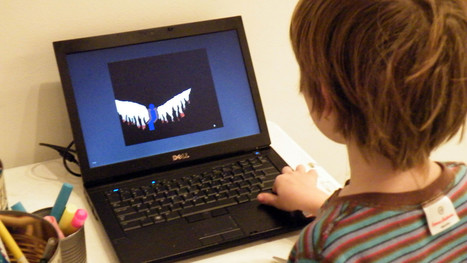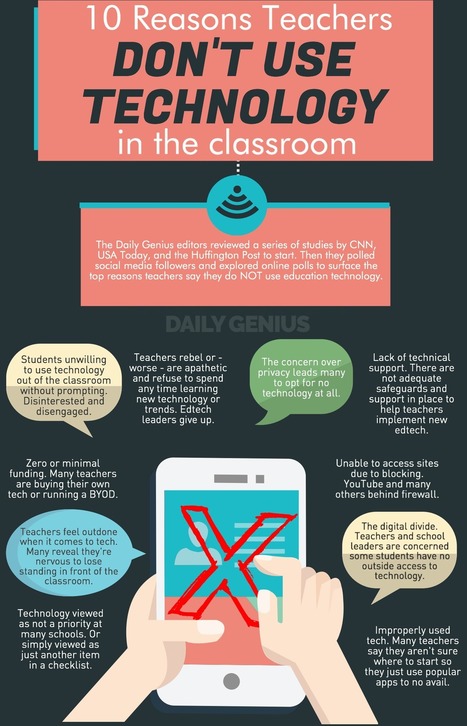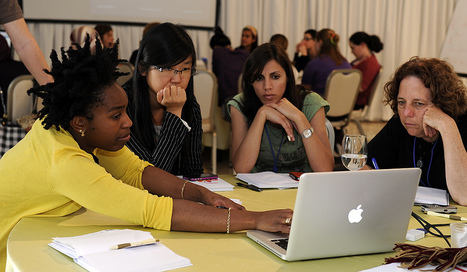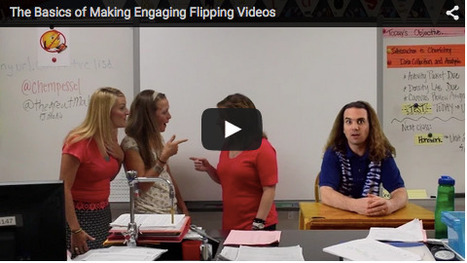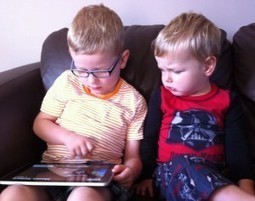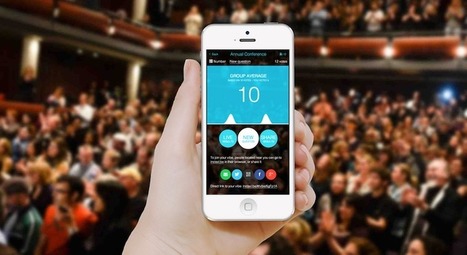 Your new post is loading...
 Your new post is loading...

|
Scooped by
Mel Riddile
June 25, 2015 6:06 PM
|
Here are some effective online tools that can help you make the art of writing essays more attractive for your students.

|
Scooped by
Mel Riddile
June 21, 2015 6:36 PM
|
Twitter can be an immensely useful tool for teachers, regardless of the subject or age range of students you teach. There are tons of Twitter Tips out there, written for new users and seasoned veterans. There are too many lists to count that enumerate great accounts to follow, chats to participate in, hashtags to check …

|
Rescooped by
Mel Riddile
from Fitness, Health, and Wellness
June 21, 2015 1:39 PM
|
Parents often feel caught between schools pushing for more digital skill building and their own desire to parent in the way they see fit.
Via Roxana Marachi, PhD

|
Scooped by
Mel Riddile
June 17, 2015 11:49 AM
|
About 100 Virginia high school students will be able to participate in a pilot program where they take all of their courses online from a state-run virtual school.
Virginia To Offer Online Pilot Program This Fall. The Washington Post (6/15, Balingit) reports this fall a Virginia Department of Education pilot program will allow about 100 high school students “to take all of their classes online.” The state’s online school, Virtual Virginia, “traditionally has offered Advanced Placement, electives and foreign language courses for students,” but this school year it will offer “all of the core coursework Virginia students need to earn a high school diploma.”

|
Scooped by
Mel Riddile
June 15, 2015 6:04 PM
|
Despite the constant hand-wringing that smartphones will lead to the downfall of society, there's mounting evidence that your phone habit may not be so bad after all.
In fact, there are ways your phone might actually be good for you.
We've compiled a list of apps to boost your brainpower, hone your memory, and even improve your emotional intelligence.
Via John Evans

|
Scooped by
Mel Riddile
June 9, 2015 6:14 PM
|
There are plenty of reasons teachers do not use education technology. It’s expensive. It’s hard to always find a reason to implement edtech into a particular lesson. That’s all true and valid, really. But what are the other big reasons that teachers don’t use technology in the classroom? We did a little digging through surveys, […]

|
Rescooped by
Mel Riddile
from Health Education Resources
June 9, 2015 10:00 AM
|
ABSTRACT
Objectives: To study the associations of screen time (Internet / video games / television) with health-related behaviors and outcomes in adolescents.
Methods: Regression analyses were performed to assess the associations of screen time with several health-related behaviors and outcomes in 2425 Dutch adolescents.
Results: Screen time was associated with bullying, being bullied, less physical activity, skipping school, alcohol use and unhealthy eating habits. Compulsive and excessive screen times were associated respectively with several psychosocial problems and being overweight.
Conclusions: Screen time was of significant importance to adolescent health. Behavioral interrelatedness caused significant confounding in the studied relations when behaviors were analyzed separately compared to a multi-behavioral approach, which speaks for more multi-behavioral analyses in future studies.
http://www.ncbi.nlm.nih.gov/pubmed/24001631
Via Roxana Marachi, PhD

|
Scooped by
Mel Riddile
June 6, 2015 4:29 PM
|
Looking for Netiquette Tips For Online Discussions? Check the 10 Netiquette Tips For Online Discussions!

|
Scooped by
Mel Riddile
June 2, 2015 10:12 AM
|
A collection of Twitter tips for beginners, including who to follow, how to engage, and many ways to make the most of your time.

|
Scooped by
Mel Riddile
May 31, 2015 12:56 PM
|
Last week, we started this series of articles by exploring published best practices with a focus on creating content. This week we continue learning about

|
Rescooped by
Mel Riddile
from Into the Driver's Seat
May 31, 2015 12:24 PM
|
The very basics of what to do when making educational videos for flipping a class. Many thanks to Jaclyn Pessel @chempessel, Meghan Klement @klemistry and Cara Johnson @AHSAnatomy for volunteering to be in this video!
Content Times:
0:12 Turn off your phone
0:36 Silence extraneous noises
1:00 Post a “Do Not Disturb” sign
1:26 Make sure you are actually recording
1:41 Look at the camera
2:08 Think about the video background
2:30 Remain stationary
2:52 Use big text
3:44 DON’T USE ALL CAPS!
3:55 Use drop shadow
4:20 Video length
4:53 Speak at a normal pace
5:22 Summary
Via Jim Lerman

|
Scooped by
Mel Riddile
May 28, 2015 6:10 PM
|
Implementing new technology in the classroom can be difficult. Teachers need time to explore and understand the technology before using it in the classroom.
|

|
Scooped by
Mel Riddile
June 23, 2015 6:09 PM
|
Overview Twitter Basics for Teachers: vocabulary and the what you need to do to participate in the best professional learning of your career.

|
Scooped by
Mel Riddile
June 21, 2015 1:43 PM
|
children spend substantial amounts of time with media including television, computers, and mobile devices and rather than focusing solely on child screen time, this survey sought to understand the role of the parents in creating the home media environment in which children are being raised today.
Three main findings from this study:
In contrast to the popular press image that mobile technology is the new pacifier used to calm and quiet down children, our survey shows that parents today have a range of tools at their disposal and other tools are used more often than mobile technologies. Parents are more likely to use toys or activities (87%), books (79%), and TV (77%) when they need to keep children occupied than mobile media devices like smartphones or iPads (37% among those who have one).
Parents have encyclopedias full of information at their fingertips, storybooks on their kindles, and a selection of games in their pocket, yet for most parents media is not their number one concern, it is not something that they often have family conflict about, and most parents say new mobile devices do not make parenting easier. Fewer parents were concerned with the impact of media on their children especially compared to more global issues like health, nutrition, and social emotional skills. Most parents (70%) say smartphones and tablets do not make parenting easier. Also, media use does not cause family conflicts.
Yes, young children spend considerable amounts of time with screen media (see Common Sense Media, 2011), but so do their parents. And it seems that parents of young children may be setting the stage for the home media environment that their young children will grow up in. About 27% of families were “media centric“ families. These families have parents who themselves consume an average of 11 hours of screen media a day. Most of these parents (81%) say they are “very” or “somewhat” likely to use TV to keep their child occupied when they need to get something done at home. Many children in these families (48%) have TVs in their bedroom and children spend an average of almost 4.5 hours with screen media per day. In contrast, “media light” families consist of parents who spend less than 2 hours per day with screen media. These families are less likely to enjoy watching TV or movies together as a family “a lot” and are less likely to use TV when getting their child ready for bed. Children in these families spend about an hour and a half with media each day.

|
Rescooped by
Mel Riddile
from Educational Technology News
June 19, 2015 2:29 PM
|
Students who used Oculus Rift technology and haptic gloves in an online environment outperformed those who used screen-and-mouse combinations.
Via EDTECH@UTRGV

|
Scooped by
Mel Riddile
June 15, 2015 6:08 PM
|
If you’re wondering whether you should join Pinterest, we’ll show you how to get your account set up, how other educators are using Pinterest.

|
Scooped by
Mel Riddile
June 15, 2015 11:03 AM
|
Successful leaders know that they must get out of their comfort zone to succeed. These leaders have spent a lot of time outside their comfort zone.

|
Scooped by
Mel Riddile
June 11, 2015 8:41 AM
|
Cyberwarfare hit Minnesota schools this month. Students taking the state assessment test for science had to step away from their computers after a "distributed denial-of-service” (DDoS) attack from a third-party caused servers to ground to a halt. DDoS attacks saturate servers with requests, slowing down processing speed and ultimately preventing users from accessing system resources.

|
Scooped by
Mel Riddile
June 9, 2015 5:37 PM
|
To text or not to text in English literature class?
A new study out of the National Communication Association wanted to find out whether increased smartphone and social media use in class impacted student learning — and what they found was that it had both negative and positive effects. In the study, researchers analyzed kids who were using phones in class to respond to text messages — both relevant and irrelevant to the class material. They measured the type of messages and the frequency of them, and found that students who were texting about the material actually scored higher on multiple choice tests about the subject than those who were texting about non-class related things.

|
Scooped by
Mel Riddile
June 8, 2015 7:49 PM
|
Of course it’s not actually Twitter that does this; it’s the individuals I have connected with in those 6 year, from all corners of this wonderful world and from all walks of life and cultures. These people, who I’ve built my Personal Learning Network (PLN) around, have made me laugh, cry, think, reflect, criticise, critique, avoid, seek out, and generally strive to know more about myself. The great thing is that you/they had no idea they were doing it, or even part of it. That’s because that’s what I use Twitter for. You might use Twitter for something else; running buddies, charity auctions, account complaints, celebrity stalking, coffee-shop cake comparisons. We each have our own version of the same system that offers our own unique answers or destinations. - See more at: http://www.dontwasteyourtime.co.uk/social-network/how-twitter-can-be-used-for-informal-personal-learning/#sthash.pv4HyoqJ.dpuf

|
Scooped by
Mel Riddile
June 2, 2015 1:08 PM
|
WEEK 14 – Collaborative Editing With Google Drive Well, at long last, here we are … the final week of the Try-a-Tool-a-Week challenge! It’s been a lot of fun. Over 700 teachers signed up to receive weekly emails offering quick-start

|
Rescooped by
Mel Riddile
from Digital Delights for Learners
June 2, 2015 10:09 AM
|
Pulse audiences for free using mobile devices: from a group of friends to hundreds at events. Watch results appear instantly and share them easily. Zero setup, it's a web app.
Via Ana Cristina Pratas

|
Rescooped by
Mel Riddile
from Into the Driver's Seat
May 31, 2015 12:25 PM
|
What NOT to do when making videos for flipping education.
Content Times:
0:12 Don’t use your built in microphone
0:44 Don’t ignore Audio Levels
1:29 Don’t be just a Talking Head
1:59 Don’t cut the video mid-sentence
2:15 Don’t overuse transitions and effects
2:38 Don’t go on at length without any visual change.
3:32 Don’t film outside (if you want to hear dialogue)
4:03 Don’t have continuous background music
4:30 Summary
Via Jim Lerman

|
Scooped by
Mel Riddile
May 28, 2015 6:12 PM
|
Every application in the Google Apps suite has it’s own deep feature set. Even when you think you have them all mastered, they surprise you with a few more hidden (…) Read more
|
 Your new post is loading...
Your new post is loading...
 Your new post is loading...
Your new post is loading...








